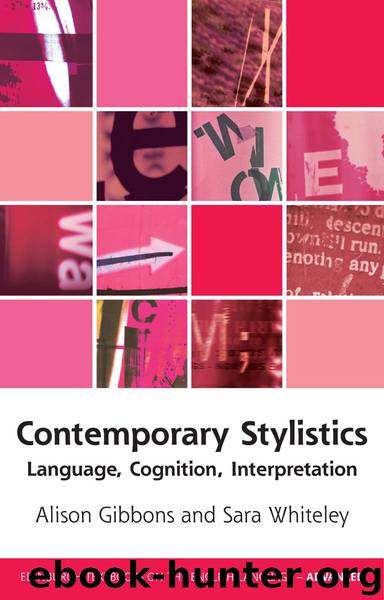Contemporary Stylistics by Alison Gibbons Sara Whiteley

Author:Alison Gibbons,Sara Whiteley
Language: eng
Format: epub, pdf
Publisher: Edinburgh University Press
Keywords and summary
Headers, informativity (first, second, and third order), principle of minimal departure, prototype (fuzzy boundaries), schema, schema alteration (accretion, refreshment, restructuring, tuning), schema effects (disruption, preservation, reinforcement), script, slots.
This chapter has introduced two big ideas about the way human knowledge and categorisation works, and discussed their application to literature. Firstly, humans use schemas and scripts derived from their previous experience in order to process new experiences. Secondly, human categorisation is organised on the basis of prototypes. We discussed how literary texts interact with readers’ schemas to produce different effects, including presenting information which causes schema disruption and creating humour through schema opposition. The prototype concept can also provide insights into the workings of literary genre classifications.
One of the main problems you may encounter as you apply schema theory to texts will likely revolve around the naming of the schemas/scripts you feel are instantiated during reading. Our knowledge structures are intricately interrelated networks and operate on multiple levels of detail/abstraction. For instance, how can we be sure that the HOTEL schema isn’t actually part of a RETAIL schema, or a DWELLING PLACE schema? Like all analytical decisions in stylistics, you need to be able to explain and justify your naming choice, and add clarity and retrievability to your discussion with specific textual evidence. If you provide detailed information about the headers which instantiated the schema, then even if your reader disagrees with your precise naming choices, they should still be able to follow your analysis.
Several sub-disciplines of cognitive linguistics are concerned with the study of knowledge structures or ICMs, and therefore knowledge structures are often referred to using different terms. The role of knowledge in language processing is also discussed in Chapter 15 ‘Cognitive grammar and construal’, which discusses conceptual bases, knowledge domains, and dominions; in Chapter 16 on metaphor, which discusses conceptual domains and image-schemas; and in Chapter 17, which discusses schemas or frames in Text World Theory.
Download
Contemporary Stylistics by Alison Gibbons Sara Whiteley.pdf
This site does not store any files on its server. We only index and link to content provided by other sites. Please contact the content providers to delete copyright contents if any and email us, we'll remove relevant links or contents immediately.
| Anthropology | Archaeology |
| Philosophy | Politics & Government |
| Social Sciences | Sociology |
| Women's Studies |
Cecilia; Or, Memoirs of an Heiress — Volume 1 by Fanny Burney(32558)
The Great Music City by Andrea Baker(32020)
Cecilia; Or, Memoirs of an Heiress — Volume 2 by Fanny Burney(31956)
Cecilia; Or, Memoirs of an Heiress — Volume 3 by Fanny Burney(31942)
We're Going to Need More Wine by Gabrielle Union(19046)
All the Missing Girls by Megan Miranda(16031)
Pimp by Iceberg Slim(14508)
For the Love of Europe by Rick Steves(14121)
Bombshells: Glamour Girls of a Lifetime by Sullivan Steve(14077)
Talking to Strangers by Malcolm Gladwell(13371)
Norse Mythology by Gaiman Neil(13370)
Fifty Shades Freed by E L James(13243)
Mindhunter: Inside the FBI's Elite Serial Crime Unit by John E. Douglas & Mark Olshaker(9344)
Crazy Rich Asians by Kevin Kwan(9292)
The Lost Art of Listening by Michael P. Nichols(7506)
Enlightenment Now: The Case for Reason, Science, Humanism, and Progress by Steven Pinker(7314)
The Four Agreements by Don Miguel Ruiz(6765)
Bad Blood by John Carreyrou(6622)
Weapons of Math Destruction by Cathy O'Neil(6281)
